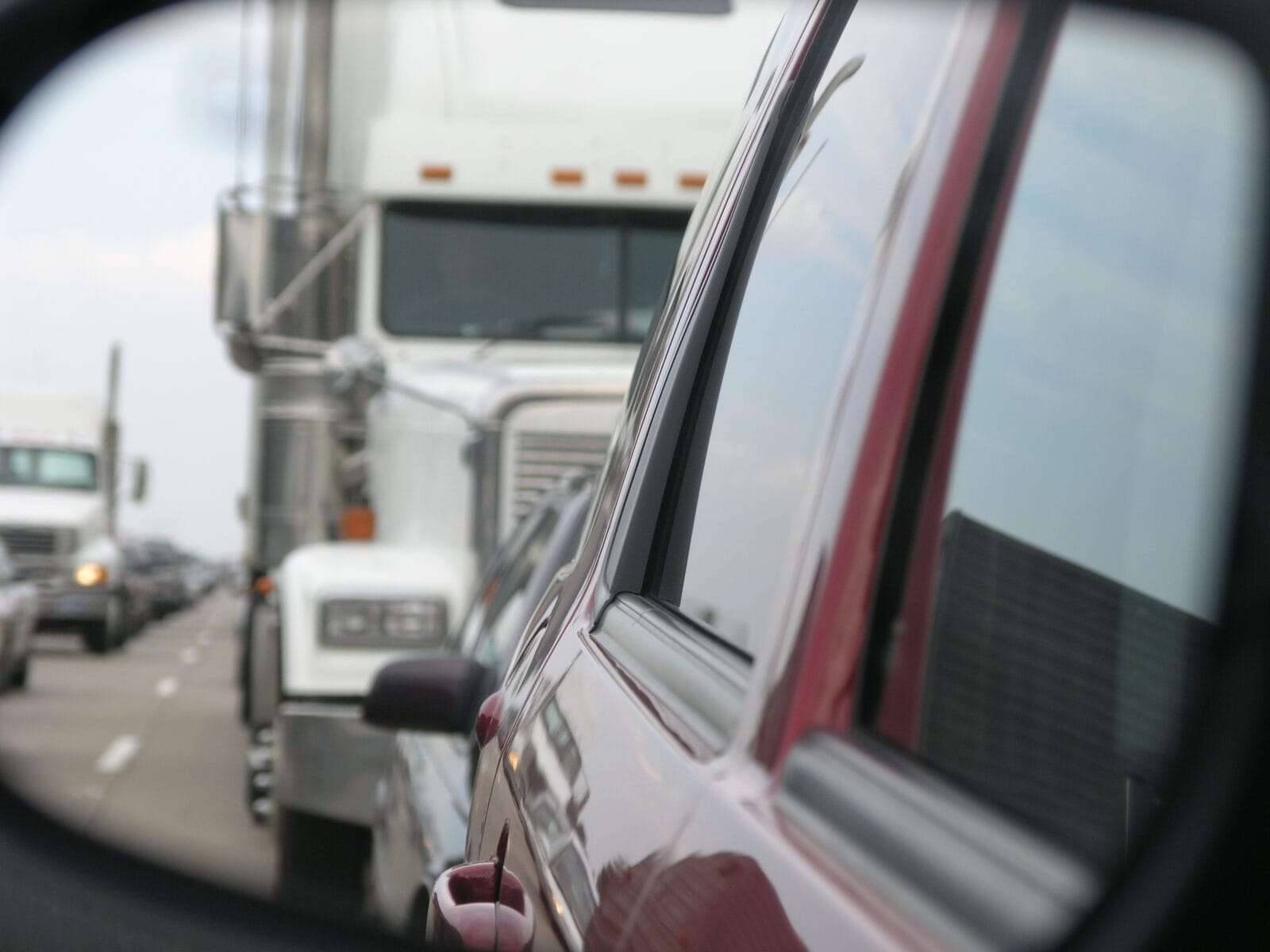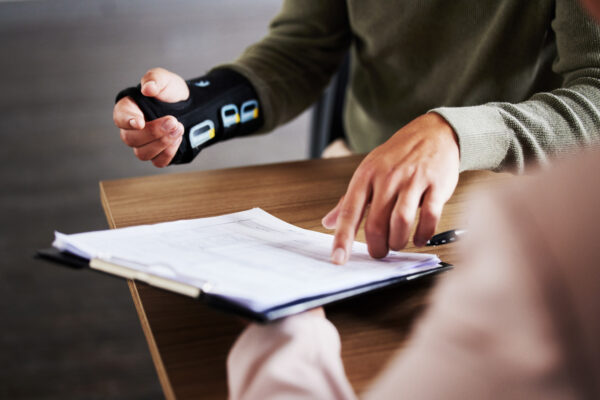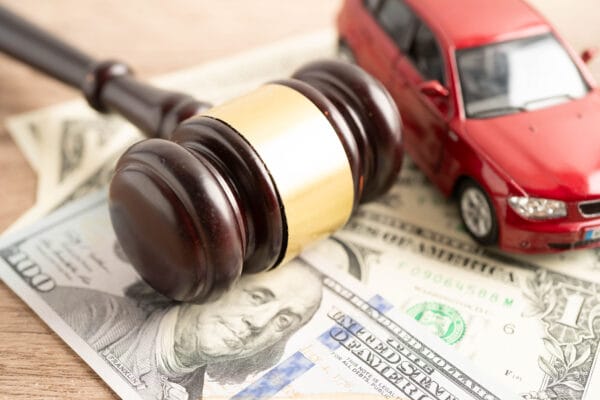
The Short Answer:
Truck accident liability establishes who can be held legally and financially accountable for a collision. Figuring out who is liable in a truck accident is more complicated than in a typical car crash. Liability can fall on the truck driver, the trucking company, a parts manufacturer, a maintenance provider, or even the party that loaded the cargo. Determining fault often requires an in-depth investigation into federal trucking regulations, driver behavior, and vehicle maintenance records.
At Lowry Law, our Maine truck accident lawyers know how to uncover the truth and hold all responsible parties accountable. Below, we explain how truck accident liability works, who can be held responsible, and what steps you should take if you’ve been injured.
Key Takeaways
- Multiple Parties May Share Fault: Liability can extend to drivers, trucking companies, parts manufacturers, cargo loaders, or maintenance providers.
- Negligence Is the Foundation of Liability: Proving fault requires showing duty, breach, causation, and damages.
- Strong Evidence Is Key: Black box data, logbooks, maintenance records, and expert analysis often determine who is responsible.
- Maine’s Comparative Negligence Rule Applies: You may still recover damages if you are less than 50% at fault, though compensation is reduced by your share of responsibility.
- An Attorney Strengthens Your Case: A skilled lawyer can investigate all liable parties, negotiate with powerful insurers, and take your case to court if necessary.
Table of Contents
- What Is Truck Accident Liability?
- Who Is Liable in a Truck Accident?
- 1. The Truck Driver
- 2. The Trucking Company
- 3. Truck Manufacturer or Parts Supplier
- 4. Cargo Loaders or Shippers
- 5. Maintenance and Service Providers
- How Is Liability Determined in a Truck Accident?
- What If Multiple Parties Are Liable?
- What If You Are Partially Responsible?
- What Compensation Is Available in a Maine Truck Accident Lawsuit?
- What to Do After a Truck Accident
- How Can a Lawyer Help Your Truck Accident Liability Case?
- Take Control of Your Truck Accident Liability Claim With Lowry Law
What Is Truck Accident Liability?
Truck accident liability refers to the legal and financial responsibility for a crash involving a commercial truck. Because trucking involves many players—drivers, companies, shippers, and mechanics—fault isn’t always clear. The law looks at negligence, federal safety regulations, and contractual responsibilities to decide who pays damages after a truck accident lawsuit.
Who Is Liable in a Truck Accident?
Several parties may be at fault in a truck accident case, depending on the circumstances of the crash. Because commercial trucking involves many moving parts, liability often extends beyond just the driver.
1. The Truck Driver
Drivers may be directly liable if they act negligently, such as:
- Driving while fatigued or violating hours-of-service regulations
- Speeding or engaging in reckless driving
- Driving under the influence of alcohol or drugs
- Texting or becoming distracted while behind the wheel
Truck drivers are held to higher standards than regular motorists due to the size and danger of their vehicles. A single error can have devastating consequences.
2. The Trucking Company
Trucking companies may be held responsible through vicarious liability, which holds employers accountable for their drivers’ negligence on the job. Beyond that, companies can be independently at fault if they:
- Fail to properly maintain their fleet
- Pressure drivers to meet unrealistic deadlines, leading to fatigue
- Cut corners on training or background checks when hiring drivers
- Ignore federal safety and inspection requirements
In many cases, company negligence is tied directly to creating unsafe conditions that make accidents more likely.
3. Truck Manufacturer or Parts Supplier
When a defective part contributes to a crash—such as brake failure, tire blowouts, or steering malfunctions—the truck or parts manufacturer may face product liability claims. These cases often involve proving that a design flaw, manufacturing error, or failure to warn about potential dangers made the truck unsafe to operate.
4. Cargo Loaders or Shippers
Improperly loaded or unbalanced cargo can destabilize a truck, leading to rollovers, jackknifes, or cargo spills. Shippers and cargo loaders must follow strict weight limits and securement procedures. When they fail, they may be held financially responsible for resulting damages.
5. Maintenance and Service Providers
Many trucking companies outsource their maintenance to third-party service providers. If a mechanic skips inspections, installs faulty parts, or fails to identify issues that later cause a crash, they may be liable for negligence. Poor recordkeeping or rushed service can also point to their fault.
How Is Liability Determined in a Truck Accident?
Establishing truck accident liability requires proving negligence and connecting it to the crash. Courts and insurers look at both the legal elements of negligence and the specific cause of the accident to decide who is financially responsible.
The 4 Elements of Negligence
- Duty of Care: Every driver on the road owes others a duty to operate their vehicle safely. For truck drivers, this duty is heightened because of the size, weight, and potential danger of their vehicles. Trucking companies, manufacturers, and maintenance providers also have a duty to ensure their trucks are safe and operated responsibly.
- Breach of Duty: A breach occurs when someone fails to act as a reasonably prudent person (or company) would under similar circumstances. Examples include a driver ignoring rest requirements, a company skipping safety inspections, or a mechanic failing to repair worn brakes.
- Causation: It isn’t enough to show that someone acted carelessly—you must also connect their conduct directly to the crash. For instance, if a driver falsified logbooks and then fell asleep at the wheel, their breach of duty clearly caused the accident.
- Damages: Finally, you must show that the accident led to measurable harm. Damages can include medical expenses, lost wages, pain and suffering, and property damage. Without proven damages, even negligent behavior may not result in liability.
Evidence Used to Prove Truck Accident Liability
Because truck accidents are complex, gathering the right evidence is crucial for building a strong claim. Common forms of evidence include:
- Accident Scene Documentation: Photos, videos, skid marks, and witness statements that help reconstruct what happened.
- Black Box Data: Electronic logging devices (ELDs) record speed, braking patterns, hours of service, and sudden movements that show how the truck was being operated.
- Driver Logbooks: Records that reveal whether the driver followed mandatory rest periods or exceeded allowed hours behind the wheel.
- Maintenance and Inspection Records: Proof of whether the trucking company or service provider performed necessary checks and repairs.
- Employment and Training Files: Documents that may expose negligent hiring or inadequate training by the trucking company.
- Expert Analysis: Accident reconstruction specialists, medical experts, and engineers can testify about how the crash occurred and who is likely at fault.
By combining these types of evidence, an attorney can paint a clear picture of who is liable in a truck accident and hold the responsible parties accountable.
What If Multiple Parties Are Liable?
Truck accidents often involve multi-party liability, meaning more than one person or company may share fault.
- Complex Operations: Trucking involves many entities—drivers, carriers, loaders, and mechanics—each with its own responsibilities. A failure at any level can contribute to a crash.
- Increased Compensation: When more than one party is found liable, victims can pursue claims against multiple insurance policies. This often increases the total financial recovery available.
- Vicarious Liability: Under this legal principle, a trucking company can be held accountable for the negligent actions of its drivers while they’re on the job. This ensures injured victims are not limited to seeking compensation from an individual driver’s resources alone.
For example, a fatigued driver might be liable for falling asleep, but the trucking company that pressured them to drive extra hours may also share responsibility. Similarly, a blown tire could make the manufacturer liable, but the maintenance company may share fault for missing the defect.
Because of these overlapping responsibilities, untangling liability requires an experienced truck accident attorney. At Lowry Law, we investigate every potential source of fault, preserve evidence, and build a case to help maximize your potential compensation by holding all negligent parties accountable.
What If You Are Partially Responsible?
In some truck accident cases, the injured person may share part of the blame. Maine follows a modified comparative negligence rule. This means:
- You can still recover damages if you were less than 50% at fault for the accident.
- However, your compensation will be reduced by your percentage of fault.
- If you are found 50% or more responsible, you cannot recover damages.
For example, if your damages total $100,000 but you are found 20% at fault, your recovery would be reduced to $80,000.
Insurance companies often try to push blame onto victims to minimize payouts. A lawyer can challenge unfair fault assessments, present evidence to reduce your share of liability, and help ensure your potential compensation reflects the true extent of your losses.
What Compensation Is Available in a Maine Truck Accident Lawsuit?
Victims of truck accidents often face significant financial and personal losses. Through an insurance claim or a truck accident lawsuit, you may be able to recover compensation for:
- Medical Expenses: Coverage for emergency treatment, hospital stays, surgeries, prescription medications, physical therapy, and long-term care needs.
- Lost Wages and Reduced Earning Capacity: Compensation for the income you missed while recovering, and for any future earnings lost if your injuries affect your ability to work.
- Pain and Suffering: Financial recognition for the physical pain, emotional distress, and loss of quality of life caused by the accident.
- Property Damage: The cost to repair or replace your vehicle and any personal items destroyed in the crash.
Trucking insurers have teams of lawyers working to limit payouts. At Lowry Law, we fight to make sure Maine truck accident victims and their families receive full and fair compensation—not just the first low offer from an insurance adjuster. Our team can investigate the accident to identify all liable parties and insurance, calculate the true value of your damages, negotiate with insurers to pursue a fair settlement, and take your case to trial if the insurance company refuses to pay what you may be owed.
What to Do After a Truck Accident
If you’re hurt in a commercial truck accident, take these steps to protect your rights:
- Call 911 and seek medical attention immediately.
- Document the scene with photos and collect witness information if possible.
- Avoid speaking with the trucking company’s insurer before consulting a lawyer.
- Contact a truck accident attorney who can preserve evidence and begin investigating liability.
How Can a Lawyer Help Your Truck Accident Liability Case?
Truck accident claims are some of the most complex personal injury cases, often involving multiple liable parties, federal trucking regulations, and aggressive insurance companies. To get the best results, you need more than just legal representation—you need a law firm that knows how to win tough cases.
At Lowry Law, we bring over 50 years of combined experience representing injury victims in Portland, Greater Bangor, Lewiston, and across Maine. Our deep knowledge of both state and federal trucking laws, along with our dedication to client service, sets us apart.
- Investigate Every Potential Source of Liability: We examine all possible sources of fault, not just the truck driver. Our team examines the trucking company’s records, cargo loading procedures, maintenance logs, and even manufacturer defects to make sure every negligent party is held accountable.
- Handle Negotiations With Powerful Trucking Insurers: Trucking companies often carry multi-million-dollar insurance policies, and their insurers fight hard to protect their bottom line. We know their tactics, and we use decades of experience to push back and demand the compensation you may be owed.
- Take Cases to Court When Necessary: While most cases settle without the need for a lawsuit, we are fully prepared to file a lawsuit if that is what it takes. Sometimes cases even need to go to trial. Our attorneys have the skills to stand up to big trucking corporations when it matters most.
- Local, Client-Focused Representation: As a Maine-based law firm, we provide the personal attention of a local team that cares about our community, while bringing the resources and experience needed to take on national trucking companies.
- No Recovery, No Fee: With free case reviews and contingency-based representation, you pay nothing upfront and nothing at all unless we win your case.
When you choose Lowry Law, you’re choosing a team that puts your recovery first. From day one, we handle every aspect of your case so you can focus on healing. Our goal is simple: to provide the personal attention of a local Maine firm with the results-driven approach of a seasoned litigation team.
Take Control of Your Truck Accident Liability Claim With Lowry Law
Understanding truck accident liability is only the first step toward recovery. The reality is that trucking companies and their insurers will do everything they can to limit what they pay, often leaving victims with less than they may deserve.
Our attorneys at Lowry Law have the experience, deep local knowledge, and proven track record to stand up to powerful trucking companies. We know how to uncover the truth, hold every negligent party accountable, and pursue the maximum compensation available under the law.
Don’t face the aftermath of a truck accident alone. Contact Lowry Law today for a free case review. You pay nothing unless we win.






